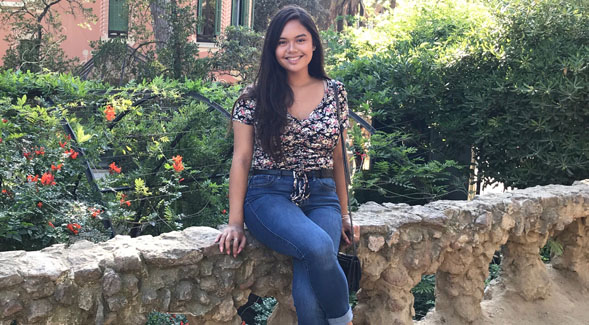Making Bilingual Speech Language Therapy More Accessible
Elise Ramirez is a senior helping to promote telepractice to assess ones native language.

Undergrad Research Spotlight: This is part of a series on undergraduate research opportunities at SDSU and the programs that help support a future pipeline of scientists from diverse and underrepresented groups. Stories in this series include a microbiology researcher and an engineering researcher.
Growing up only 15 minutes from the U.S.-Mexico border, rising senior Elise Ramirez is passionate about providing bilingual speech-language therapy to underrepresented communities.
A first-generation Filipina American college student, Ramirez was introduced to Mexican culture and the Spanish language at a young age. Through an immersion program offered by all of the schools she attended in Chula Vista, Ramirez learned Spanish from kindergarten until high school. This early education inspired her to double major in Spanish and speech, language, and hearing studies while at SDSU.
Having been influenced by the Mexican-American community growing up, Ramirez hopes to portray how vital it is to have an assessment in one’s native language. Since there aren’t many bilingual speech-language pathologists (SLPs), she hopes to assist by promoting telepractice, an online resource for clients to meet with SLPs.
Ramirez now has her foot in the door to research, helping doctoral student Quynh Dam with a dissertation on a bilingual SLP project, Caregivers Assisting Remote Evaluations (CARE) that aims to use telepractice for Vietnamese American families to receive language evaluations.
Through the Summer Undergraduate Research Program, Ramirez was given the opportunity to help with backend research for Dam, who works with associate professor Giang Pham in the School of Speech, Language and Hearing Sciences. The project began in May and continues throughout the summer.
Dam and Ramirez will be working with children from the San Diego Unified School District as well as from local Vietnamese communities in areas such as Mira Mesa.
“Elise started in the Bilingual Development in Context laboratory as a first-year student, and I can’t believe she will be in her fourth year this fall,” Pham said. “It has been a pleasure to see her grow academically and in research. Elise is a strong student, hard worker, and passionate about improving services for bilingual communities.”
The SDSU News Team spoke with Ramirez about her research.
What is your role in the project?
I am working with Quynh on developing some of the materials and protocols for one of the goals in her study, which is to conduct language assessments with preschoolers over Zoom with the help of their caregivers [family members and others]. I am helping to develop a protocol for training caregivers to help with the language assessment. I am also helping with creating the pre- and post-questionnaires to seek caregiver feedback on the telepractice study. Using Qualtrics, a survey platform, I am also creating surveys for scoring the language assessment.
How do you conduct this research?
CARE is a telepractice study. We are conducting language assessment with Vietnamese American preschoolers over Zoom with the help of their caregivers. The language assessment involves collecting language samples for analyses. To collect language samples we will ask the children to tell a story, retell a story, and talk about some personal experiences. The caregivers will help their child with Zoom navigations and will help in implementing the tasks. They will also answer pre- and post-questionnaires to help us better understand their opinions as well as experience with the telepractice study.
How did you become interested in doing this type of research?
I took an introductory class within my major and Dr. Pham came as a guest speaker to present her research and findings. I emailed her immediately after and applied as a research assistant. I just ended up loving everything about the lab and what we do there.
What is your goal in doing this research?
There is a shortage of bilingual speech-language pathologists (SLPs) for Vietnamese speakers, an understudied yet large U.S. population. Our goal is to better understand telepractice as a service delivery model for Vietnamese American families, particularly in the area of language assessment with bilingual preschoolers. Many bilingual children are misdiagnosed for language impairment when evaluated only in one language, typically English. Telepractice can connect families in need of bilingual services to bilingual SLPs, who can complete assessment in both languages. Ultimately, this project has the ability to increase families’ access to bilingual SLPs and improve language assessment for Vietnamese American preschoolers.
What does it mean for you to be getting this opportunity to do such research as an undergrad?
I think a lot of people approach opportunities differently. I'm the kind of person who just embraces it with arms wide open. This opportunity means a lot to me and will definitely benefit me in the long run, because I do want to be a bilingual SLP. It’s important that I get to see the process of conducting effective research so that I can understand how to apply the results clinically.
What are your future plans after you graduate?
I was studying in Spain when the pandemic first hit, so I want to go back there and teach English for a year after I graduate. After that, I want to come back and enroll in graduate school so I can get my certification to be an SLP.



